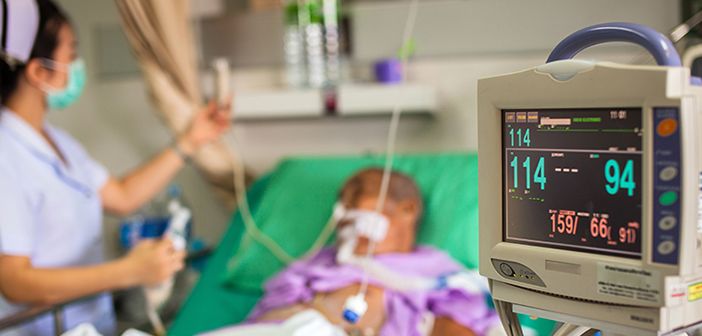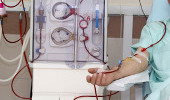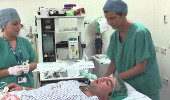Treatment in Intensive Care
Get a quote nowIC treatment deals with the most critical cases and involves special procedures and monitoring

Intensive care usually takes place in intensive care units (ICUs). It refers to the specialized, intensive treatment given to patients who are acutely and life-threateningly unwell. It is reserved for patients who require the most critical medical care.
Most patients in ICU are there as emergency admissions due to severe injuries (i.e. from car accidents). Heart attacks, strokes, and other sudden and critical deterioration to one’s health are other common causes of emergency admissions.
Some patients have a planned admission following major surgery and other serious treatments. Unless you are an emergency admission, you will need a referral/planned admission from a doctor or medical specialist to be admitted to a hospital’s ICU.
What to Expect from Intensive Care Treatment
An Intensive Care Unit is the most critically functioning operational environment in a hospital. ICU teams are made up of elite, multi-disciplinary medical professionals trained to provide intensive care for a variety of surgeries, traumas, and critical medical conditions.
Some hospitals have ICUs that specialize in treating specific conditions and injuries. Some such specialized ICUs include:
- Major burns units
- Organ transplant units
- Cardiothoracic surgery units (treating conditions of the heart and lungs)
- Respiratory failure units.
The environment of each ICU will reflect the specialist medical procedures performed there. ICUs are extremely sterile and have a high concentration of specialized technical and monitoring apparatus.
Intensive Care Equipment
The ICU of a hospital in a developed nation will likely have state-of-the-art medical equipment. Equipment and apparatus may differ depending on the specific kind of ICU in question. A typical general-purpose ICU will include heart monitors, ventilators, and other breathing-assistance equipment, a dialysis machine and tubing for intravenous infusions. There are many other kinds of specialized equipment that may be used for treatments in intensive care.
Intensive Care Staff
Due to the critical nature of their work, surgeons, nurses and other medical specialists tend to be highly trained and capable. Most are used to dealing with a wide variety of situations. For example, some patients may become aggressive (especially due to brain injury). Doctors in ICU understand the causes and how best to handle them.
Some ICUs have a dedicated counselor to provide support for patients and their families.
Intensive Care Insurance
Receiving crucial treatment in intensive care will be covered – at least in part – by any comprehensive medical scheme. But different health plans have different kinds of cover and differing rates. Use CompareInsurance to search and compare all insurance types and offers. CompareInsurance simplifies the process of finding the best medical scheme for you and your family.
In this article
What to Expect from Intensive Care Treatment
Intensive Care Equipment
Intensive Care Staff
Intensive Care Insurance
Our top health insurance guides / articles
View all health insurance guides

Joint Health Insurance
Why a joint health insurance policy cound be perfect for you and your partner?

Treatment for kidney dialysis
More than 2000 patients living in the UAE are currently undergoing dialysis

Medical aid for pensioners
Senior citizens are one demographic which may be compromised when it comes to premiums on medical aid

Specialist Consultations
Pediatricians, dermatologists, obstetrician/gynecologists, anesthetists, and ophthalmologist specialists

Healthcare Cash Plans
Some policies would pay out cash weekly as a benefit if the policyholder is admitted to the hospital

Self-pay Healthcare Plans
This would be a great option if you do not want the monthly or annual premiums

Types of healthcare insurance
Each medical insurance policy would be different and every insurance company would offer different types of medical insurance plans

Features and benefits of healthcare insurance
There are many different types of medical insurance and the features and benefits of each policy

How to get affordable health insurance?
It’s very simple and you have to take the time and compare a range of medical insurance plans

How to choose the best health insurance for you and your family?
If you are a first-time medical insurance policy buyer or currently shopping around we have put together some tips

Private health insurance
Your employer would give you basic health insurance but that is not always enough for your need

What To Do When a Loved One Passes Away
This is not an easy time for anyone but it’s important to prepare for these unfortunate events.

Why you and your family needs health insurance
Paying medical costs out of your packet can be financially crippling and you can’t put a price on health

What does health insurance actually cover you for?
The basic sector would most likely exclude dental, ear and eye care which is crucial for all people

Medical Coverage Plans
A health insurance plan is one of the best and safest ways to ensure you have financial cover in the case of a medical emergency

How co-pay works on your health insurance policy?
Some insurers call the co-payment “excess” and this can be a specific amount or a percentage of the claim.

Medical repatriation
Check your policy to understand if medical repatriation is a benefit, this means would your medical insurance cover you

Medical Aid for Students
Student medical aid would be at a more affordable rate for students who are still busy studying

Plans for pre-existing conditions
You can get personal financial solutions that fit your life and budget as your life changes

Is medical aid affordable?
It’s possible that you can tailor your health plans or choose your medical aid to best suit your needs and your pocket

Rehabilitation Treatment
This benefit offers you a holistic approach to treating your pain by highly trained professionals

What’s Covered in Regional Healthcare Policies?
Regional healthcare policies cover residents in the UAE and other GCC countries. The coverage and pricing of these policies can vary greatly

What’s Covered in International Healthcare Policies?
International health insurance should offer comprehensive cover for people living abroad

What Hospitals Are Included in Your Network Tier on Your Health Insurance Policy?
Health insurance tier systems should help consumers compare similarly priced health plans

Treatment in Intensive Care
IC treatment deals with the most critical cases and involves special procedures and monitoring

Outpatient Consultations, Diagnostic Tests and Prescribed Drugs
Many medical plans include “outpatient cover”

In-patient and Day-patient Hospital Treatment
In-patient and day-patient care covers most treatments in hospitals and clinics. But what are the differences between them?

Anaesthetists Roles and Fees in Health Insurance
Like surgeons, anaesthetists may charge a separate fee for their services during medical procedures

Surgeons Roles and Fees in Health Insurance
How does your health insurance handle surgical fees, and what is the surgeon’s role in your health plan coverage?

Help with Costs to Return After Treatment
One of the options available under many healthcare plans is cover for the cost of returning to the UAE after treatment abroad

Radiology Tests
Radiology, also known as diagnostic imaging, is the science of diagnosing and treating various types of diseases

Transplant Services
In the UAE, health plans cover the cost of organ transplants. Costs for the acquisition of the organs is, however, not necessarily covered.

Treatment Administered by a Registered Acupuncturist
In the UAE, coverage for alternative treatments such as acupuncture are usually associated with high-end plans only

Compassionate Visits
This additional insurance covers the cost of travel for a family member to visit you should you be hospitalized

Personal Health Insurance
Having personal health insurance is an advisable preventative measure against unexpected health costs

Can I get Health Insurance If I Smoke?
Here’s what you need to know about smoking and health insurance









 Physiotherapy
Physiotherapy






